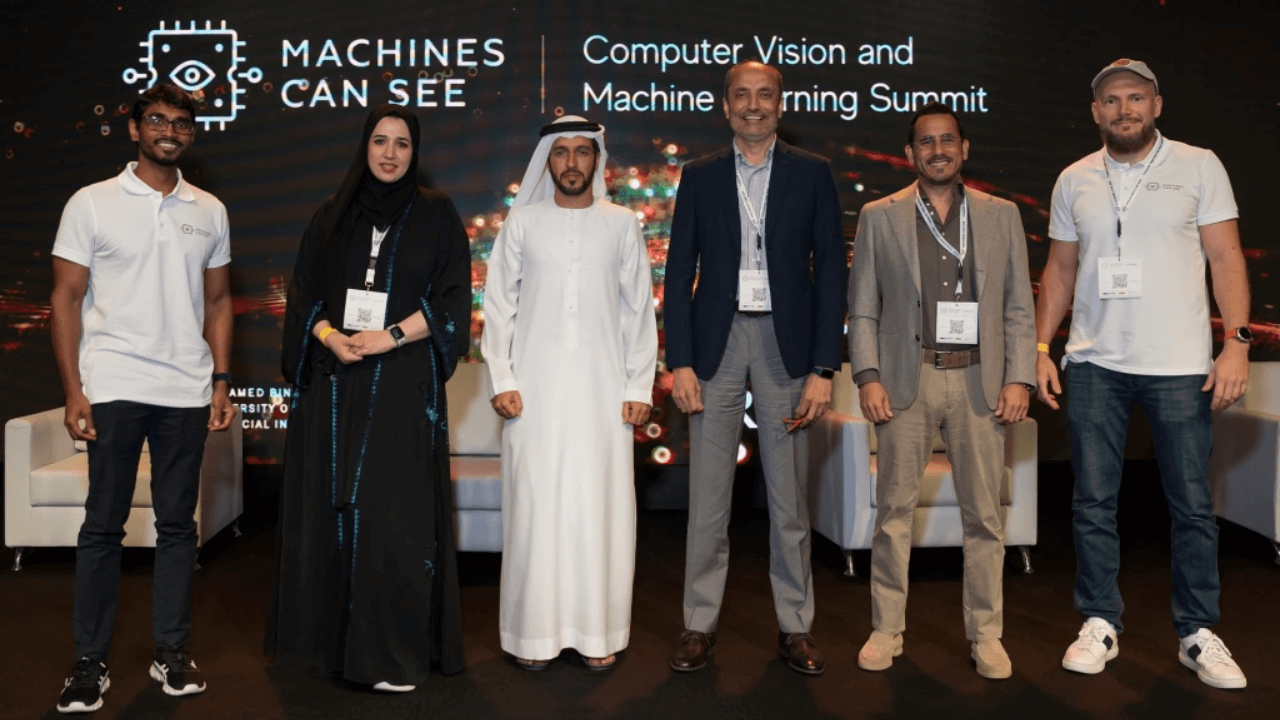Machines Can See Summit 2023
The UAE government held an international conference on Artificial Intelligence (AI) called the ‘Machines Can See 2023’ Summit at the Museum of the Future in Dubai. The conference focused on the limitless possibilities of AI in governance and business. Policymakers, businesses, and academia from all over the world attended the summit. The summit highlighted ‘Dub.ai’ as the AI hub, as reflected by its name.
About Machines Can See 2023 Summit
- A one-day international conference on Artificial Intelligence (AI) named ‘Machines Can See 2023’ was organized by the UAE Ministry for Artificial Intelligence, Digital Economy and Remote Work Applications, in partnership with Dubai Future Labs, an initiative of the Dubai Future Foundation in collaboration with the ‘Machines Can See’ company.
- The summit was held at the Museum of the Future in Dubai in partnership with the Department of Economy and Tourism and the Dubai Future Foundation.
- The event brought together policymakers, businesses, and academia to explore the possibilities of AI in governance and business.
- The partnership aimed to strengthen the UAE’s global status as a hub of advanced technologies, particularly in AI.
- The UAE is the only country with a state-level AI program, which reflects its commitment to promoting AI technology and establishing itself as a global leader in the field.
- The ‘Machines Can See 2023’ Summit aimed to explore the potential of AI and its future applications in the UAE and globally.
- The main objective of the conference was to bring together experts from around the world to discuss the current advancements of AI and its potential in contributing to the UAE’s vision of creating the next Silicon Valley.
- Policymakers, businesses, and academia attended the conference, which featured presentations and panel discussions by various AI experts.
- The panel discussions focused on the future of AI in the UAE and its potential to become the next Silicon Valley.
What is AI (Artificial Intelligence)?
- AI, or Artificial Intelligence, refers to the development of computer systems that can perform tasks that typically require human intelligence, such as learning, problem-solving, decision-making, and language understanding.
- AI systems use algorithms and mathematical models to analyze data, learn from patterns, and make decisions or predictions based on that analysis.
- AI can be used in a wide range of applications, including image and speech recognition, natural language processing, robotics, and autonomous systems.
- Some examples are – ChatGPT, Digital assistants such as Siri, Alexa, Google Assistant, etc.
- Geoffrey Hinton, a prominent computer scientist and pioneer in the field of artificial intelligence (AI) known as the “Godfather” of AI, has left Google, leading to concerns about the future of AI. Hinton’s recent statement expressing regret about his life’s work has only added to these concerns.
How Does AI Work?
- AI systems typically work by processing large amounts of data using algorithms and statistical models.
- The data is used to train the AI system to recognize patterns and make predictions based on those patterns.
- There are different types of AI, including rule-based systems, which rely on a set of predefined rules to make decisions, and machine learning systems, which learn from data without being explicitly programmed.
- Machine learning systems can be further categorized into supervised learning, unsupervised learning, and reinforcement learning, each with its own unique approach to learning from data.
- In general, AI systems require large amounts of high-quality data, powerful computing resources, and sophisticated algorithms to achieve their goals.
About United Arab Emirates (UAE)
- The United Arab Emirates (UAE) is a country located in the Middle East, bordered by Saudi Arabia to the south and Oman to the east and north.
- The UAE consists of seven emirates, with Abu Dhabi as its capital. Dubai is the most populous and well-known city in the UAE.
- The UAE is a federal absolute monarchy, with the President of the UAE serving as both the head of state and the head of government.
- The currency of the UAE is called the United Arab Emirates Dirham (AED).
- The country is known for its oil reserves and as a global hub for trade, tourism, and finance. In recent years, the UAE has also been investing heavily in advanced technologies, particularly in the field of artificial intelligence.
- The government has launched various initiatives to promote AI, including the establishment of the Ministry of Artificial Intelligence and the hosting of international conferences and summits on AI.
- The UAE is home to the world’s tallest building, the Burj Khalifa, and is known for its luxurious hotels, shopping malls, and tourist attractions such as the Dubai Mall and the Palm Jumeirah.
- President – Sheikh Mohamed bin Zayed Al Nahyan (since May 2022)
- 3 August Current Affairs 2023 in English
- MoU Between Subroto Mukerjee Sports and Education Society and All India Football Federation (AIFF) to Promote Football at Grassroot Level
- Dr. Mansukh Mandaviya Delivers Keynote Address at the 13th Indian Organ Donation Day ceremony
- Education Ministry Forms Expert Panel on Anti-Discrimination in Higher Education
- Concerns Arise Over Cheetah Deaths at Kuno National Park
FAQs
What are the 7 UAE states?
The UAE was formed in 1971 when six emirates, including Abu Dhabi, Dubai, Sharjah, Ajman, Umm Al-Quwain, and Fujairah united to become a federation. The seventh emirate, Ras Al Khaimah, joined the federation the following year. The capital city of the UAE is Abu Dhabi, which is located in the largest and wealthiest emirate.
What exactly AI means?
AI stands for Artificial Intelligence. It refers to the development of computer systems that can perform tasks that typically require human intelligence, such as visual perception, speech recognition, decision-making, and language translation. AI technologies include machine learning, natural language processing, robotics, and computer vision. The goal of AI is to create intelligent machines that can learn, reason, and perform tasks autonomously, without human intervention.
